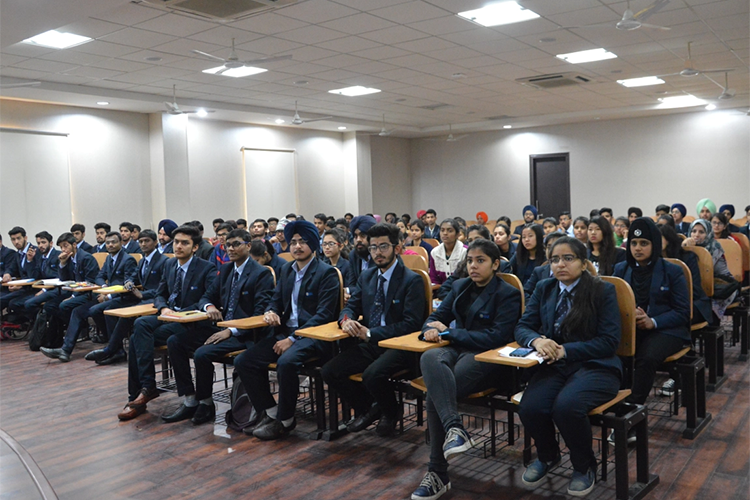Course Structure
The Bachelor of Commerce (Hons.) program at Gulzar Group of Institutions offers a comprehensive curriculum spanning six semesters.
Business Organization and Management covers the structure, functions, and administration of businesses. It includes topics like organisational theories, leadership styles, strategic planning, and operational control for effective management.
Financial Accounting involves recording, summarising, and reporting financial transactions. It includes preparing financial statements, understanding balance sheets, income statements, and cash flow statements to provide insights into a company’s financial health.
Managerial Economics applies microeconomic principles to business decision-making. It involves analysing market conditions, cost structures, and economic trends to guide strategic planning, pricing, and resource allocation.
English in a commerce program focuses on enhancing communication skills, including reading comprehension, writing proficiency, and effective presentation techniques. It supports clear articulation of ideas, crucial for business and management roles.
This subject emphasises ethical principles, integrity, and social responsibility, guiding students to make morally sound decisions and contribute positively to society.
This subject involves analysing and controlling costs associated with production and operations. It includes budgeting, cost analysis, and financial reporting to optimise resource use and improve profitability.
Business Environment examines the external and internal factors affecting businesses, including economic, social, legal, technological, and political conditions. It helps in understanding how these factors impact business strategies and operations.
Business Statistics involves the collection, analysis, and interpretation of data to make informed business decisions. It includes techniques for summarising data, estimating trends, and predicting future performance.
Environmental Science studies the interaction between humans and the environment. It includes analysing ecosystems, understanding environmental issues, and developing solutions for sustainability and conservation.
Mentoring and professional development focus on guiding individuals through career growth and skill enhancement. It includes personalised advice, skill-building activities, and networking opportunities to advance in one’s profession.
Management accounting involves analysing financial data to aid internal decision-making. It includes budgeting, performance evaluation, and cost analysis, providing insights for strategic planning and operational efficiency.
Mercantile law governs commercial transactions and business practices. It covers contract law, sales of goods, negotiable instruments, and trade regulations, ensuring fair dealings and resolving disputes in commercial activities.
Human Resource Management (HRM) involves recruiting, managing, and developing an organisation’s workforce. It includes tasks such as hiring, training, performance evaluation, employee relations, and compliance with labour laws.
Indian Economy covers the economic system and growth of India, including sectors like agriculture, industry, and services. It examines economic policies, development strategies, and financial systems influencing India’s economic progress.
Mentoring and professional development focus on guiding individuals through career growth and skill enhancement. It includes personalised advice, skill-building activities, and networking opportunities to advance in one’s profession.
Corporate Accounting involves the recording, analysis, and reporting of financial transactions within a corporation. It includes preparing financial statements, managing budgets, and ensuring compliance with regulations.
Company Law governs the formation, operation, and dissolution of companies. It includes regulations on corporate structure, governance, shareholder rights, and compliance requirements to ensure legal and ethical business practices.
Income Tax Law and Practice involves understanding tax regulations, filing requirements, and compliance for individuals and businesses. It covers income tax calculations, deductions, exemptions, and legal procedures for tax reporting and disputes.
Entrepreneurship Development focuses on nurturing skills and knowledge needed to start and manage successful businesses. It covers business planning, financial management, innovation, and strategies for growth and risk management.
Mentoring and professional development focus on guiding individuals through career growth and skill enhancement. It includes personalised advice, skill-building activities, and networking opportunities to advance in one’s profession.
Financial Management involves planning, organising, directing, and controlling financial activities. It includes budgeting, financial analysis, investment decisions, and managing assets and liabilities to maximise profitability and ensure financial stability.
Goods and Services Tax (GST) is a comprehensive tax levied on the supply of goods and services. It integrates various indirect taxes into a single tax system, ensuring seamless tax credits and reducing the tax burden across the supply chain.
Personal financial planning involves managing finances to achieve personal goals. It includes budgeting, investing, saving for retirement, and risk management, ensuring financial stability and long-term wealth growth.
Advanced financial management focuses on complex financial strategies and decision-making. It involves capital budgeting, risk management, financial modelling, mergers and acquisitions, and optimising financial performance to maximise value.
Mentoring and professional development focus on guiding individuals through career growth and skill enhancement. It includes personalised advice, skill-building activities, and networking opportunities to advance in one’s profession.
Banking and Insurance examines financial systems, banking operations, and insurance principles. It covers risk management, investment strategies, and regulatory frameworks, equipping students with skills for careers in financial services and insurance industries.
Industrial relations and labour laws encompass regulations and practices related to employer-employee relationships. This includes managing labour disputes, ensuring fair labour practices, compliance with labour laws, and promoting harmonious workplace environments.
Operation Research involves using mathematical models and analytical methods to solve complex decision-making problems. It focuses on optimising processes, improving efficiency, and making data-driven decisions in various business operations.
Banking Laws and Services cover regulations and legal frameworks governing banking institutions. It includes aspects such as compliance, regulatory requirements, banking operations, financial products, and customer rights and protections.
Risk Management and Insurance involve identifying, assessing, and mitigating risks to protect assets and financial stability. It includes strategies for risk assessment, insurance policies, and claims management to safeguard against financial losses and uncertainties.
Mentoring and professional development focus on guiding individuals through career growth and skill enhancement. It includes personalised advice, skill-building activities, and networking opportunities to advance in one’s profession.
Accounting & Finance focuses on financial reporting, budgeting, and investment analysis. It covers principles of accounting, financial management, and strategic planning, preparing students for careers in financial analysis, accounting, and corporate finance.
















































